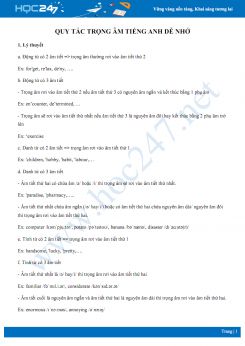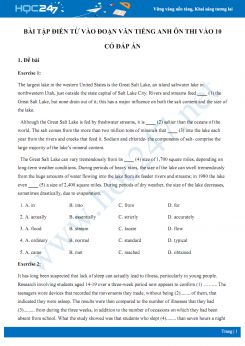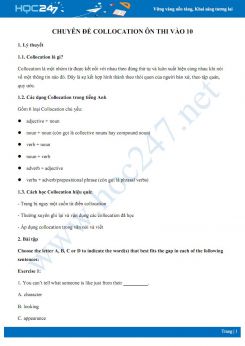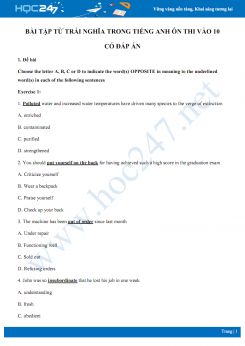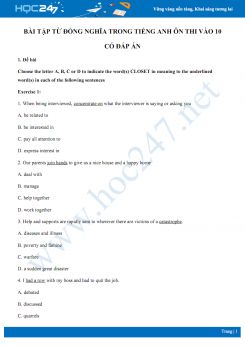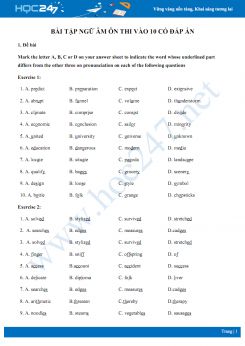Mời các em cùng tham khảo tài liệu Chuyên đề câu bị động ôn thi vào 10 do Hoc247 tổng hợp và biên soạn. Tài liệu bao gồm lý thuyết và các dạng bài tập khác nhau về câu bị động, giúp các em ôn lại kiến thức đã học. Hi vọng tài liệu này sẽ giúp các em ôn tập thật tốt cho kì thi tuyển sinh vào lớp 10 sắp tới. Chúc các em học tập tốt!
CHUYÊN ĐỀ CÂU BỊ ĐỘNG ÔN THI VÀO 10
1. Lý thuyết
1.1. Định nghĩa câu bị động
- Câu bị động được dùng khi muốn nhấn mạnh đến đối tượng chịu tác động của hành động hơn là bản thân hành động đó. Thì của động từ ở câu bị động phải được chia theo thì của động từ ở câu chủ động.
- Ví dụ:
The cake is made by my little brother (Chiếc bánh này được làm bởi em trai của tôi)
Trong câu này, tác giả muốn truyền đạt nhấn mạnh hành động chiếc bánh này được làm bởi em trai. Câu bị động ở đây có vai trò tuyên dương, trân trọng hành động của của người thực hiện.
1.2. Điều kiện biến đổi câu bị động:
- Động từ (verb) trong câu chủ động phải là Transitive Verb (ngoại động từ phải có tân ngữ phía sau)
1.3. Cấu trúc:
Active: S + V + O
Passive: S + be + V3/V-ed + by + O
Lưu ý: “be” chia theo thì của động từ
1.4. Quy tắc biến đổi câu bị động:
- Xác định thành phần trong câu: Chủ ngữ (S)? Động từ (V)? Tân ngữ (O)?
- Xác định thì của động từ chính
- Lấy O trong câu chủ động làm S cho câu bị động. Lấy S trong câu chủ động làm O và đặt sau By trong câu bị động.
- Biến đổi V chính trong câu chủ động thành P2 (Past Participle) trong câu bị động.
- Thêm To be vào trước P2 trong câu bị động (To be phải chia theo thời của V chính trong câu chủ động và chia theo số của S trong câu bị động)
1.5. Bảng công thức các thì phổ biến trong câu bị động:
|
Tense (thì) |
Chủ động (Active) |
Bị động (Passive) |
|
1. The present simple (Thì hiện tại đơn) |
S + V (s/es) + O |
S + am/ is/ are + PII + (by O) |
|
2. The present continuous (Thì hiện tại tiếp diễn) |
S + am/ is/ are + V-ing + O |
S + am/ is/ are + being + PII + (by O) |
|
3. The present perfect (Thì hiện tại hoàn thành) |
S + have/ has + PII + O |
S + have/ has + been + PII + (by O) |
|
4. The present perfect continuous (Thì hiện tại hoàn thành tiếp diễn) |
S + have/ has + been + V-ing |
S + have/ has + been + being + PII + (by O) |
|
5. The simple past (Thì quá khứ đơn) |
S + V-ed + O |
S + was/ were + PII + (by O) |
|
6. The past continuous (Thì quá khứ tiếp diễn) |
S + was/ were + V-ing |
S + was/ were + being + PII + (by O) |
|
7. The past perfect (Thì quá khứ hoàn thành) |
S + had + PII + O |
S + had been + PII + (by O) |
|
8. The past perfect continuous (Thì quá khứ hoàn thành tiếp diễn) |
S + had + been + V-ing + O |
S + had + been + being + PII + (by O) |
|
9. The simple future ( Thì tương lai đơn) |
S + will/ shall + V + O |
S + will/ shall be + PII + (by O) |
|
10. The simple continuous (Thì tương lai tiếp diễn) |
S + will/ shall + be + V-ing + O |
S + will/ shall + be + being + PII + (by O) |
|
11. The simple future perfect (Thì tương lai hoàn thành) |
S + will/ shall + have + PII + O |
S + will/ shall + have + been + PII + (by O) |
|
12. The near future (Thì tương lai gần) |
S + be going to + V + O |
S + be going to + be + PII + (by O) |
|
13. Modal verbs (can, could, should, shall, may, might, must,…) |
S + Modal + V-bare Inf + O |
S + Modal + be + PII + (by O) |
1.6. Các dạng câu bị động
a. Bị động với những động từ có 2 tân ngữ: Những động từ có hai tân ngữ thường là give (đưa), lend (cho mượn), send (gửi), ….
Ví dụ: I send her a letter (Tôi gửi cho cô ấy một bức thư)
O1 O2
=> A letter is sent to him
=> He is sent a letter by me
b. Bị động với các động từ tường thuật
- Các động từ tường thuật gồm: assume, believe, claim, expect, feel, find, know, say,…
- Cấu trúc:
Chủ động: S1 + V1 (tường thuật) that S2 + V2
Bị động: S1 + be + PII + to V2
It + be + PII + that + S2 + V2
- Ví dụ: People say she is very smart
=> She is said to be very smart
=> It’s said that she is very smart
c. Câu chủ động là câu nhờ vả: với các động từ have, get, make
- Have sb do st => have st done
Ví dụ: Thomas has his son buy a cup of coffee.
→ Thomas has a cup of coffee bought by his son.
- Make sb do st => St + be made + to V + (by sb)
Ví dụ: Suzy makes the hairdresser cut her hair.
→ Her hair is made to cut by the hairdresser.
- Get + sb + to V +st => get + st + PII + (by sb)
Ví dụ: Shally gets her husband to clean the kitchen for her.
→ Shally gets the kitchen cleaned by her husband.
2. Bài tập
2.1. Turn these sentences into passive
1. Tom will visit his parents next month
2. Her mother is preparing the dinner in the kitchen
3. She will have Peter wash her car tomorrow
4. My father waters this flower every morning.
5. John invited Fiona to his birthday party last night
6. They are pulling down the old theatre
7. The organizers will exhibit the paintings till the end of the month
8. The burglars had cut an enormous hole in the steel door
9. People must not leave their bikes in the hall
10. Someone repaired her car yesterday
2.2. Turn these sentences into passive
1. Do they teach English here?
2. Will you invite her to your wedding party?
3. Has Tom finished the work?
4. Did the teacher give some exercises?
5. Have they changed the window of the laboratory?
6. What books are people reading this year?
7. How did the police find the lost man?
8. Who look after the children for you?
9. How long have they waited for the doctor?
10. What time can the boys hand in their papers?
2.3. Give the correct form of words in following sentences
1. Toshico had her car (repair) .............. by a mechanic.
2. Ellen got Marvin (type) ..................her paper.
3. We got our house (paint) .................. last week.
4. Dr Byrd is having the students (write ) ................... a composition.
5. Mark got his transcripts (send)................... to the university.
2.4. Rewrite each sentence so that it contains the word capitals
1. Candidates may not use the dictionaries (BY)
2. People said that the President was killed by a mad man (IT)
3. I didn’t realize that someone was recording our conversation (BEING)
4. They asked me some difficult questions at the interview (I)
5. I am going to move my things next week (BE)
2.5. Turn these sentences into passive
1. They have her tell the story again
2. John gets his sister to clean his shirt
3. Anne had had a friend type her composition
4. Rick will have a barber cut his hair
5. I will get the dressmaker to make a new dress
6. He had a mechanic repair his car
7. She often gets the technician to maintain the heater
ĐÁP ÁN
2.1. Turn these sentences into passive
1. Tom’s parents will be visited (by him) next month
2. The dinner is being prepared (by her mother) in the kitchen
3. She will have her car washed tomorrow.
4. This flower is watered (by my father) every morning
5. Fiona was invited to John’s birthday party last night
6. The old theatre is being pulled down
7. The paintings will be exhibited till the end of the month
8. An enormous hole in the steel door had been cut by the burglars
9. Their bikes must not be left in the hall
10. She had her car repaired yesterday
2.2. Turn these sentences into passive
1. Is English taught here?
2. Will she be invited to your wedding party?
3. Has the work been finished by Tom?
4. Were some exercises given by the teacher?
5. Has the window of the laboratory been changed?
6. What books are being read this year?
7. How was the lost man found by the police?
8. By whom are the children looked after for you?
9. How long has the doctor been waited for?
10. What time can their papers be handed in by the boys?
2.3. Give the correct form of words in following sentences
1. Toshico had her car (repair) ....repaired.......... by a mechanic.
2. Ellen got Marvin (type) ..........to type........her paper.
3. We got our house (paint) .......painted........... last week.
4. Dr Byrd is having the students (write ) .......write............ a composition.
5. Mark got his transcripts (send)........cut........... to the university.
2.4. Rewrite each sentence so that it contains the word capitals
1. The dictionaries are not used by candidates
2. It was said that the President was killed by a mad man
3. I didn’t realize that our conversation is being recorded
4. I was asked some difficult questions at the interview
5. My things are going to be moved next week
2.5. Turn these sentences into passive
1. They have the story again
2. John gets his shirt cleaned
3. Anne has had her composition typed
4. Rick will have his hair cut
5. I will get a new dress made
6. He had his car repaired
7. She often gets the heater maintained
---
Trên đây là toàn bộ nội dung của tài liệu Chuyên đề câu bị động ôn thi vào 10. Để theo dõi nhiều tài liệu tham khảo hữu ích khác vui lòng đăng nhập vào hệ thống hoc247.net chọn chức năng xem online hoặc tải về máy!
Các em quan tâm có thể tham khảo tư liệu cùng chuyên mục:
Chúc các em học tốt!



